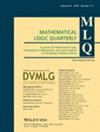Forcing axioms for λ-complete μ + $\mu ^+$ -c.c.
IF 0.4
4区 数学
Q4 LOGIC
引用次数: 0
Abstract
We consider forcing axioms for suitable families of μ-complete -c.c. forcing notions. We show that some form of the condition “ have a in ” is necessary. We also show some versions are really stronger than others.
λ完备μ +$ \mu ^+$ -c的强迫公理。
我们考虑了μ-完备μ + $\mu ^+$ -c.c.强迫概念的合适族的强迫公理。我们证明了某种形式的条件p 1,p2 $p_1,p_2$有一个≤Q - lub $\le _{{\mathbb {Q}}}\text{-}{\rm lub}$在Q ${\mathbb {Q}}$”是必要的。我们还展示了一些版本确实比其他版本更强大。
本文章由计算机程序翻译,如有差异,请以英文原文为准。
求助全文
约1分钟内获得全文
求助全文
来源期刊
CiteScore
0.60
自引率
0.00%
发文量
49
审稿时长
>12 weeks
期刊介绍:
Mathematical Logic Quarterly publishes original contributions on mathematical logic and foundations of mathematics and related areas, such as general logic, model theory, recursion theory, set theory, proof theory and constructive mathematics, algebraic logic, nonstandard models, and logical aspects of theoretical computer science.

 求助内容:
求助内容: 应助结果提醒方式:
应助结果提醒方式:


